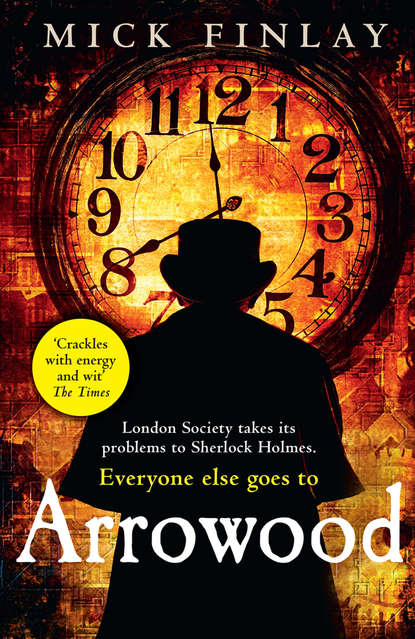По всем вопросам обращайтесь на: info@litportal.ru
(©) 2003-2024.
✖
Arrowood
Автор
Год написания книги
2019
Настройки чтения
Размер шрифта
Высота строк
Поля
Chapter Twenty-Nine (#litres_trial_promo)
Chapter Thirty (#litres_trial_promo)
Chapter Thirty-One (#litres_trial_promo)
Chapter Thirty-Two (#litres_trial_promo)
Chapter Thirty-Three (#litres_trial_promo)
Chapter Thirty-Four (#litres_trial_promo)
Chapter Thirty-Five (#litres_trial_promo)
Chapter Thirty-Six (#litres_trial_promo)
Chapter Thirty-Seven (#litres_trial_promo)
Read On (#litres_trial_promo)
Chapter One (#ulink_ba8fef50-8aa2-58bc-92da-7c8aeb67f923)
South London, 1895
The very moment I walked in that morning I could see the guvnor was in one of his tempers. His face was livid, his eyes puffy, his hair, least what remained on that scarred knuckle of a head, stuck out over one ear and lay flat with grease on the other side. He was an ugly sight, all right. I lingered by the door in case he threw his kettle at me again. Even from there, I could smell the overnight stink of gin on his foul breath.
‘Sherlock blooming Holmes!’ he bellowed, slamming his fist down on the side-table. ‘Everywhere I look, they’re talking about that charlatan!’
‘I see, sir,’ I replied as meek as I could. My eyes tracked his hands as they swung this way and that, knowing that a cup, a pen, a piece of coal might quick as a flash get seized and hurled across the room at my head.
‘If we had his cases we’d be living in Belgravia, Barnett,’ he declared, his face so red I thought it might burst. ‘We’d have a permanent suite in the Savoy!’
He dropped to his chair as if suddenly tuckered out. On the table next to his arm, I spied what had caused his temper: The Strand magazine, open at the latest of Dr Watson’s adventures. Fearing he’d notice me looking, I turned my attention to the fire.
‘I’ll put the tea on,’ I said. ‘Do we have any appointments today?’
He nodded, gesturing in the air in a defeated manner. He’d shut his eyes.
‘A lady’s coming at midday.’
‘Very good, sir.’
He rubbed his temples.
‘Get me some laudanum, Barnett. And hurry.’
I took a jug of scent from his shelf and sprayed his head. He moaned and waved me away, wincing as if I were lancing a boil.
‘I’m ill,’ he complained. ‘Tell her I’m indisposed. Tell her to come back tomorrow.’
‘William,’ I said, clearing away the plates and newspapers scattered across his table. ‘We haven’t had a case for five weeks. I have rent to pay. I’ll have to go work on Sidney’s cabs if I don’t bring money home soon, and you know how I don’t like horses.’
‘You’re weak, Barnett,’ he groaned, slumping further in his chair.
‘I’ll clean the room, sir. And we’ll see her at midday.’
He did not respond.
At twelve o’clock sharp, Albert knocked on the door.
‘A lady to see you,’ he said in his usual sorrowful fashion.
I followed him down the dark corridor to the pudding shop that fronted the guvnor’s rooms. Standing at the counter was a young woman in a bonnet and a billowing skirt. She had the complexion of a rich woman, but her cuffs were frayed and brown, and the beauty of her almond face was corrupted by a chipped front tooth. She smiled a quick, unhappy smile, then followed me through to the guvnor’s rooms.
I could see him weaken the moment she walked in the door. He began to blink and jumped to his feet and bowed his head low as he took her wilted hand.
‘Madam.’
He gestured to the best seat – clean and next to the window so there was a little light thrown onto her handsome physique. Her eyes quickly took in the piles of old newspapers that lined the walls and were stacked in some places to the height of a man.
‘What can I do for you?’
‘It is my brother, Mr Arrowood,’ she said. It was clear from her accent she was from the continent. ‘He’s disappeared. I was told you can find him.’
‘Are you French, mademoiselle?’ he asked, standing with his back to the coal fire.
‘I am.’
He glanced at me, his fleshy temples red and pulsing. This was not a good start. Two years before, we’d been thrown into the clink in Dieppe when the local magistrate decided we were asking too many questions about his brother-in-law. Seven days of bread and cold broth had crushed all the admiration he had for the country right out of him, and to make it worse our client had refused to pay us. The guvnor had held a prejudice against the French ever since.
‘Mr Arrowood and me both have a great admiration for your race, miss,’ I said before he had a chance to put her off.
He scowled at me, then asked, ‘Where did you hear of me?’
‘A friend gave me your name. You are an investigative agent, yes?’
‘The best in London,’ I said, hoping a little praise would soothe him.
‘Oh,’ she replied. ‘I thought Sherlock Holmes . . .’
I could see the guvnor tense again.
‘They say he is a genius,’ she continued. ‘The best in all the world.’
‘Perhaps you should consult him then, mademoiselle!’ snapped the guvnor.
‘I cannot afford him.’
‘So I am second best?’






